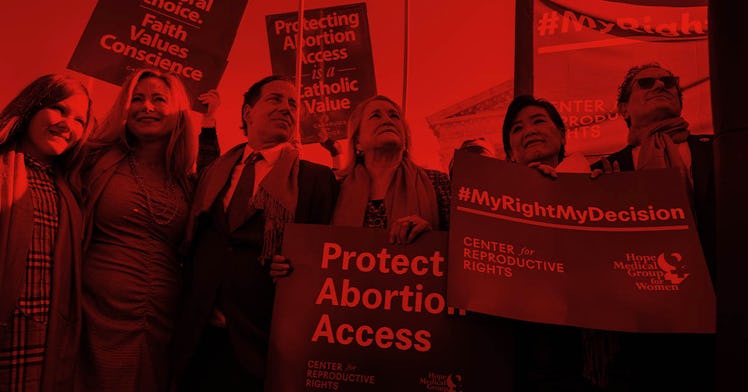Supreme Court Silence on Texas Abortion Law Likely Spells End of Roe v. Wade
By doing nothing, a partisan Court allows a conservative state to eliminate a foundational medical freedom. And that's just the beginning.

Roe v. Wade didn’t go out with a bang, but with a whimper. It wasn’t a stated opinion from the Supreme Court’s conservative majority that has functionally ended Roe, a sweeping new legal doctrine ending nearly five decades of bodily autonomy for pregnant people. It was the silence of the Court, a departure from its norms and an abdication of responsibility, that took away the freedoms Roe afforded American families.
When the clock struck midnight last night, the Supreme Court had not responded to an emergency petition from abortion rights groups asking the Court to intervene before the anti-abortion law went into effect on September 1st. The Court’s inaction means that Senate Bill 8 is now the law in Texas and that abortion after six weeks, which makes up 85 to 90 percent of abortions performed in the state, are now criminal acts there.
“As Senate Bill 8 nearly closes down abortion care today, our ability to provide the best health care for our patients has been turned over to self-appointed vigilantes and whoever holds the power at any moment,” said Amy Hagstrom Miller, president, and CEO of Whole Woman’s Health and Whole Woman’s Health Alliance.
Miller is referring to the enforcement mechanism within SB 8, which allows any citizen to sue in state court anyone who intends to “abet” an abortion — which can mean everything from performing an abortion to driving someone to a doctor’s office or donating to a group that funds or otherwise facilitate abortions — whether or not they follow through on their intention.
If the plaintiff wins, they receive $10,000 plus attorneys’ fees; if they lose, the accused “abettors” do not recoup their attorneys’ fees. Furthermore, if an abortion provider is sued successfully under SB 8, the state court is required to shut them down.
“This law essentially bans abortions and codifies intimidation. Anti-abortion politicians are empowering extremists to use lawsuits to harass and intimidate anyone who helps someone get an abortion,” says Kamyon Conner, executive director of the Texas Equal Access Fund.
Fatherly covered SB 8 in detail yesterday, but the basic idea is that by having non-governmental entities enforce the law, abortion-rights groups can’t simply sue a state agency and win an injunction from a federal judge citing Roe v. Wade. SB 8 also locks litigation into state courts that are now obliged to ignore Roe because of the six-week ban, disrupting the abortion rights groups’ proven legal strategy to enforcing the federal precedent that enshrines a person’s right to terminate a pregnancy.
The federal judiciary could step in, but the results on that front have not been encouraging for healthcare advocates. The Fifth Circuit Court of Appeals, which has jurisdiction in Texas, took the extraordinary step of canceling a preliminary injunction against SB 8 issued by a lower court in advance of a hearing, which the Fifth Circuit also canceled.
That left the Supreme Court as the only remaining option, but the justices have remained silent thus far. And though the Court could still issue a ruling at any moment, it’s hard to think of a reason why the majority would. The Court has already agreed to hear a case that directly challenges Roe this fall, which isn’t normally a good sign for the precedent in question.
If the six conservative justices are willing to ban abortion, it represents the culmination of the conservative legal project that got them on the Court in the first place.
SB 8 is the perfect law for the justices to ignore, as it delivers the same outcome as explicitly overturning Roe — every state with an anti-choice legislature and governor will likely pass its own version of SB 8, banning abortion in wide swaths of the United States — while preserving the appearance of judicial impartiality.
But no matter how it happens, if SB 8 is allowed to stand, it will introduce dramatic limitations to Americans’ freedom to obtain abortions. Existing obstacles to care — far-flung clinics, a dearth of available appointments, and harassment from zealous protestors — will be exacerbated. Clinics around the country will close, harassment via financial ruinous lawsuits will spread. A safe, necessary medical procedure will be practically out of reach for millions.